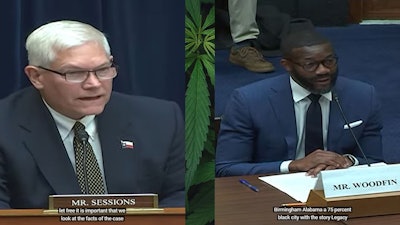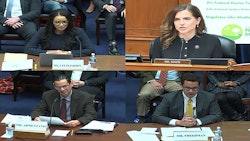
“Just briefly before I answer the congresswoman’s question—words matter—and while I’m on record, I just would like to say to you directly, and your committee members, that putting cannabis and slavery in the same category is patently offensive and flagrant. So, I wanted to state that.” – Birmingham, Ala., Mayor Randall Woodfin
The U.S. House’s Civil Rights and Civil Liberties Subcommittee on Nov. 15 hosted a rare opportunity in the political and cannabis reform realms: a bipartisan congressional hearing calling for an end to federal prohibition.
With subcommittee Chair Jamie Raskin, D-Md., and Ranking Member Nancy Mace, R-S.C., working across the aisle for a common cause—to reverse course from a plant’s listing on the Controlled Substances Act for more than half a century—the legislative body welcomed seven expert witnesses to help shed light on the effects of criminalization, incarceration and discrimination, among other consequences of the federal government’s refusal to recognize the medicinal values and recreational purposes of cannabis.
“Descheduling is necessary in order to close the growing and untenable divide between state and federal cannabis laws,” said Paul Armentano, executive director at NORML, one of the witnesses who has worked professionally on cannabis policy reform for nearly 30 years.
Various subcommittee members used their time to ask the witnesses about myriad issues in state-legal markets, such as barriers to entry, why equity provisions are important, why banks are reluctant to take on cannabis clients, how veterans currently get their cannabis, packaging and marketing standards, and so on, and how conflicting federal law has fallen behind.
Other legislators used their time to make personal statements without exchanging thoughts with the seven witnesses.
Rep. Pete Sessions, R-Texas, made a generalized statement about all drugs to support his opposition to cannabis reform.
“We talk about this issue as being bipartisan, but I think we also need to include all of the facts of the case,” he said. “If you look at CDC—provisional data from CDC indicates that there were an estimated 100,306 drug overdose deaths in the United States during the 12-month period that ended in April 2021—a 28.5% increase from the 78,056 deaths during the same period the year before.”
The Centers for Disease Control and Prevention statistics Sessions was referring to can be viewed here. Nowhere in the report were the words “cannabis” or “marijuana” or “THC” mentioned.
Later in the questioning segment of the hearing, Mace asked Eric Goepel, founder and CEO of the Veterans Cannabis Coalition, how many overdose deaths have been attributed to cannabis use. In his opening testimony, Goepel included details of veteran deaths by suicide, overdose and toxic exposure.
“So, I don’t believe the CDC, DEA, NIDA [National Institute on Drug Abuse] or any other federal agency has ever directly associated a fatal overdose with cannabis,” Goepel said.
“So, that means zero, right?” Mace asked.
“Zero, yes, according to the federal government,” Goepel said.
Later in the hearing, Raskin—whose home state of Maryland just voted to legalize adult-use cannabis—compared the cannabis prohibitionists of today to the alcohol prohibitionists of early 1930s (before the 21st Amendment repealed Prohibition), saying that those who oppose cannabis reform are pushing the same types of propaganda and hysteria from 90 years ago.
In opposition, part of Sessions’ message during the hearing was that “marijuana and drugs are crippling,” causing addiction, crime and mental issues, he said. The representative from Texas went on to attempt to draw a parallel between the cannabis industry and slavery.
“The product is being marketed, the product is being sold, the product is being advocated by people who are in it to make money,” Sessions said. “Slavery made money also and was a terrible circumstance that this country and the world went through for many, many years.”
Sessions’ remarks come at a time when African Americans comprise nearly one-third of those arrested for cannabis possession offenses in his home state of Texas, despite Black people comprising only 13% of the state’s total population, according to an analysis of state arrests data compiled by Texas NORML.
Nationwide, arrest data from 2001 to 2018 revealed a consistent trend: racial bias. During that time period “Blacks [were] 3.73 times more likely than whites to be arrested for marijuana,” despite roughly equal usage rates, according to the American Civil Liberties Union.
Later in the hearing, Rep. Alexandria Ocasio-Cortez, D-N.Y., asked Birmingham, Ala., Mayor Randall Woodfin about the difference between pardons and expungements. In Alabama, Woodfin has utilized a 1975 law to establish the Pardons for Progress program, pardoning more than 15,000 city residents for cannabis possession offenses, according to a joint memorandum on cannabis issued by the subcommittee the day before the hearing.
Before answering the question, Woodfin took a moment to address Sessions’ comment from roughly 20 minutes earlier in the hearing.
“Just briefly before I answer the congresswoman’s question—words matter—and while I’m on record, I just would like to say to you directly, and your committee members, that putting cannabis and slavery in the same category is patently offensive and flagrant,” he said. “So, I wanted to state that.”
Comparing the legal cannabis industry to slavery is patently offensive.
— Randall Woodfin (@randallwoodfin) November 15, 2022
I hope that Rep. @PeteSessions learns from his many Republican colleagues on the right side of this issue.
It’s past time we end the prohibition of cannabis. pic.twitter.com/psySB0Ilsc
Woodfin went on to explain how pardons are at the executive level, allowing presidents, governors and mayors to set aside penalties or release those from incarceration.
“But the expungement is extremely important because that’s more at the judicial level,” he said. “And even if you pardon me, if I apply for a job, for instance, [the charge] could still be on my record, but more importantly the arrest. So, the expungement through the judicial process allows a person’s entire record to be concealed; that’s not only the actual charge but that also includes the arrest.”


























